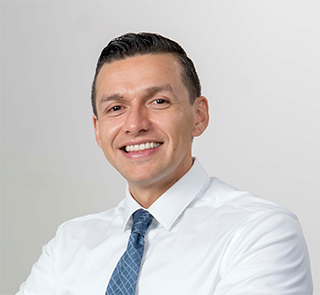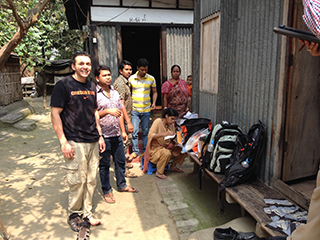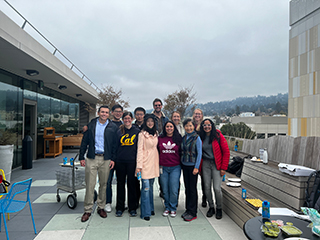September 1, 2022

Andres Cardenas, Ph.D., an assistant professor at Stanford University, is applying his epigenetics expertise to investigate how environmental exposures contribute to the development of diseases, and how to prevent them.
Epigenetics is an emerging area of research that studies how environmental factors, such as chemical exposures, alter the activity of genes without changing the DNA sequence. Unlike genetic changes, epigenetic changes can be reversible.
Where He Began
Cardenas became interested in environmental health research while he was pursuing a masters in biostatistics at Oregon State University (OSU). There he met Anna Harding, Ph.D., who introduced him to the NIEHS Superfund Research Program (SRP). At the time, Harding was the leader of their SRP Community Engagement Core.
“Dr. Harding worked with tribal members at the Umatilla Indian Reservation and introduced me to community-based participatory research,” Cardenas shared. “This experience helped me understand that public health is more than just conducting basic science, it’s about applying research to populations and working with them to understand and address their needs."

As a SRP-funded trainee at OSU, Cardenas learned about DNA research from his mentor Molly Kile, Sc.D., who was conducting research in arsenic-exposed communities in Bangladesh.
“Spending time in Bangladesh helped me better understand how biological samples, such as blood, and environmental samples are collected and analyzed, as well as the positive impact research can have on people” Cardenas said. “This emphasized my desire to continue conducting public health research and pursue a career in academia."
Launching a Research Career
Shortly after completing his postdoctoral training, Cardenas received a NIEHS Outstanding Environmental Science (ONES) award, which provides five years of continued support for scientists at the start of their careers.
“The ONES award gave me the initial boost I needed to recruit a team and launch my research career,” Cardenas reflected.
Through this award, Cardenas and team are studying how exposure to mixtures of metals and nutrients affect newborns and young children, as well as how those exposures contribute to the development of diseases contracted later in life.
“Before they are even born, babies are exposed to a variety of harmful metals, such as mercury and arsenic, as well as essential elements, like selenium and zinc. These metals can interact with each other, but little is known about their effects on children’s health,” Cardenas explained. “We are studying how these exposures can cause epigenetic changes early in childhood that may lead to disease development.”
The researchers also aim to identify biomarkers — genes or proteins that indicate the occurrence of a biological response — to catch these changes early on and potentially prevent them.
In one study, Cardenas and team, including NIEHS-funded postdoctoral researcher Anne Bozack, Ph.D., found common genes that are altered by epigenetic changes related to metal exposure.
“The same genes were modified by common metals that share similar modes of action,” Cardenas said. “This demonstrates that prenatal metal exposure is associated with epigenetic changes of genes involved in neurodevelopment that could provide a biomarker of risk.”
Revealing the Benefits of Data Sharing
Cardenas is also an integral member of the UC Berkeley SRP Center, where he co-leads the Data Management and Analysis Core.
With SRP support, Cardenas participated in an effort to collaborate with other SRP Centers to share data and answer complex questions that could not be answered by a single dataset.
Working along researchers at the Columbia University SRP Center, Cardenas and others at UC Berkeley used advanced analysis techniques to combine data from populations in Chile and Bangladesh. By combining these datasets, the team identified several changes to important biological pathways — such as autophagy — related to arsenic exposure. Autophagy, an important process of degrading unnecessary or damaged components within cells, is a potential mechanism through which arsenic exposure may lead to health problems, such as type 2 diabetes.
In a similar project with the University of New Mexico SRP Center, the team combined data from population across rural Bangladesh, Northern Chile, and Navajo Nation and implemented a mass balance approach. The mass balance model follows the principle that the amount of arsenic entering the body should equal the amount that exits the body.
“By combining data from multiple populations, we were able to better characterize additional sources of arsenic exposure, such as food, and house dust,” Cardenas explained. “This has important implications for better understanding associations between chemical exposure and disease in human studies.”
Highlighting Interdisciplinary Mentorship

“As a graduate student, I didn’t think a career in academia was a possibility for me. It wasn’t until I became an SRP trainee that I made the connections that helped me become the researcher I am today,” Cardenas reflected. “My experience with the SRP has helped me understand that environmental health research encompasses a lot of fields, including biomedical, engineering, and community outreach, and this has made me a more well-rounded and effective scientist.”
Now, a mentor for several graduate students and postdoctoral researchers at UC Berkeley, Cardenas is passionate about sharing the lessons he learned along the way.
“If there is one thing that I want my students to take away from me, it is that they have infinite options. I encourage them to be exposed to multiple fields, career paths, and topics,” Cardenas shared. “Innovation happens when people are exposed to multiple fields, and it is rewarding to see my students working cohesively to combine not only different scientific fields, but also community outreach.”


